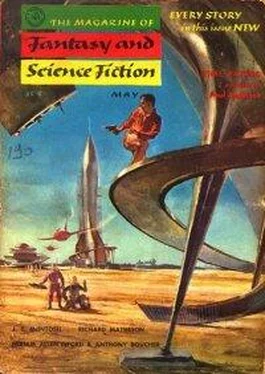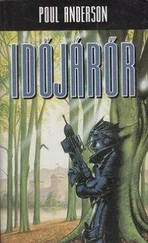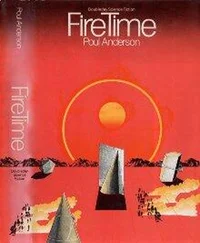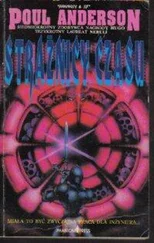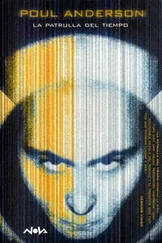Poul Anderson - Time Patrol
Здесь есть возможность читать онлайн «Poul Anderson - Time Patrol» весь текст электронной книги совершенно бесплатно (целиком полную версию без сокращений). В некоторых случаях можно слушать аудио, скачать через торрент в формате fb2 и присутствует краткое содержание. Год выпуска: 1955, Издательство: Fantasy House, Inc., Жанр: Альтернативная история, на английском языке. Описание произведения, (предисловие) а так же отзывы посетителей доступны на портале библиотеки ЛибКат.
- Название:Time Patrol
- Автор:
- Издательство:Fantasy House, Inc.
- Жанр:
- Год:1955
- ISBN:нет данных
- Рейтинг книги:4 / 5. Голосов: 1
-
Избранное:Добавить в избранное
- Отзывы:
-
Ваша оценка:
- 80
- 1
- 2
- 3
- 4
- 5
Time Patrol: краткое содержание, описание и аннотация
Предлагаем к чтению аннотацию, описание, краткое содержание или предисловие (зависит от того, что написал сам автор книги «Time Patrol»). Если вы не нашли необходимую информацию о книге — напишите в комментариях, мы постараемся отыскать её.
Time Patrol — читать онлайн бесплатно полную книгу (весь текст) целиком
Ниже представлен текст книги, разбитый по страницам. Система сохранения места последней прочитанной страницы, позволяет с удобством читать онлайн бесплатно книгу «Time Patrol», без необходимости каждый раз заново искать на чём Вы остановились. Поставьте закладку, и сможете в любой момент перейти на страницу, на которой закончили чтение.
Интервал:
Закладка:
“In the same way… oh, suppose I went back and prevented Booth from killing Lincoln. Unless I took very elaborate precautions, it would probably happen that someone else did the shooting and Booth got blamed anyway.
“That resilience of time is the reason travel is permitted at all. If you want to change things, you have to go about it just right and work very hard, usually.”
His mouth twisted. “Indoctrination! We’re told again and again that if we interfere, there’s going to be punishment for us. I’m not allowed to go back and shoot that ruddy bastard Hitler in his cradle. I’m supposed to let him grow up as he did, and start the war, and kill my girl.”
Everard rode quietly for a while. The only noise was the squeak of saddle leather and the rustle of long grass. “Oh,” he said at last. “I’m sorry. Want to talk about it?”
“Yes. I do. But there isn’t much. She was in the W.A.A.F.—Mary Nelson—we were going to get married after the war. She was in London in ’44. November seventeenth, I’ll never forget that date. The V-bombs got her. She’d gone over to a neighbor’s house in Streatham—was on furlough you see, staying with her mother. That house was blown up; her own home wasn’t scratched.”
Whitcomb’s cheeks were bloodless. He stared emptily before him. “It’s going to be jolly hard not to… not to go back, just a few years, and see her at the very least. Only see her again… No! I don’t dare.”
Everard laid a hand on the man’s shoulder, awkwardly, and they rode on in silence.
The class moved ahead, each at his own pace, but there was enough compensation so that all graduated together: a brief ceremony followed by a huge party and many maudlin arrangements for later reunions. Then each went back to the same year he had come from: the same hour.
Everard accepted Gordon’s congratulations, got a list of contemporary agents (several of them holding jobs in places like military intelligence), and returned to his apartment. Later he might find work arranged for him in some sensitive listening post, but his present assignment—for income-tax purposes, “special consultant to Engineering Studies Co.”—was only to read a dozen papers a day for the indications of time travel he had been taught to spot, and hold himself ready for a call. As it happened, he made his own first job.
3
It was a peculiar feeling to read the headlines and know, more or less, what was coming next. It took the edge off, but added a sadness, for this was a tragic era. He could sympathize with Whitcomb’s desire to go back and change history.
Only, of course, one man was too limited. He could not change it for the better, except by some freak; most likely he would bungle everything. Go back and kill Hitler and the Japanese and Soviet leaders—maybe someone shrewder would take their place. Maybe atomic energy would lie fallow, and the glorious flowering of the Venusian Renaissance never happen. The devil we know…
He looked out of his window. Lights flamed against a hectic sky; the street crawled with automobiles and a hurrying, faceless crowd; he could not see the towers of Manhattan from here, but he knew they reared arrogant toward the clouds. And it was all one swirl on a river that swept from the peaceful prehuman landscape where he had been to the unimaginable Danellian future. How many billions and trillions of human creatures lived, laughed, wept, worked, hoped, and died in its currents!
Well… He sighed, stoked his pipe, and turned back. A long walk had not made him less restless; his mind and body were impatient for something to do. But it was late and… He went over to the bookshelf, picked out a volume more or less at random, and started to read. It was a collection of Victorian and Edwardian stories.
A passing reference struck him. Something about a tragedy at Addleton and the singular contents of an ancient British barrow. Nothing more. Hm. Time travel? He smiled to himself.
Still…
No, he thought. This is crazy.
It wouldn’t do any harm to check up, though. The incident was mentioned as occurring in the year 1894, in England. He could get out back files of the London Times. Nothing else to do… Probably that was why he was stuck with his dull newspaper assignment: so that his mind, grown nervous from boredom, would prowl into every conceivable corner.
He was on the steps of the public library as it opened.
The account was there, dated June 25, 1894, and several days following. Addleton was a village in Kent, distinguished chiefly by a Jacobean estate belonging to Lord Wyndham and a barrow of unknown age. The nobleman, an enthusiastic amateur archeologist, had been excavating it, together with one James Rotherhithe, an expert from the British Museum who happened to be a relative. Lord Wyndham had uncovered a rather meager burial chamber: a few artifacts nearly rusted and rotted away, bones of men and horses. There was also a chest in surprisingly good condition, containing ingots of an unknown metal presumed to be a lead or silver alloy. He fell deathly ill, with symptoms of a peculiarly lethal poisoning; Rotherhithe, who had barely looked into the casket, was not affected, and circumstantial evidence suggested that he had slipped the nobleman a dose of some obscure Asiatic concoction. Scotland Yard arrested the man when Lord Wyndham died, on the twenty-fifth. Rotherhithe’s family engaged the services of a well-known private detective, who was able to show, by most ingenious reasoning, followed by tests on animals, that the accused was innocent and that a “deadly emanation” from the chest was responsible. Box and contents had been thrown into the English Channel. Congratulations all around. Fadeout to happy ending.
Everard sat quietly in the long, hushed room. The story didn’t tell enough. But it was highly suggestive, to say the least.
Then why hadn’t the Victorian office of the Patrol investigated? Or had they? Probably. They wouldn’t advertise their results, of course.
Still, he’d better send a memorandum.
Returning to his apartment, he took one of the little message shuttles given him, laid a report in it, and set the control studs for the London office, June 25, 1894. When he pushed the final button the box vanished with a small whoosh of air rushing in where it had been.
It returned in a few minutes. Everard opened it and took out a sheet of foolscap covered with neat typing—yes, the typewriter had been invented by then, of course. He scanned it with the swiftness he had learned.
“Dear Sir:
“In reply to yrs. of September 6, 1954, beg to acknowledge receipt and would commend your diligence. The affair has only just begun at this end, and we are much occupied at present with preventing assassination of Her Majesty, as well as with the Balkan Question, the deplorable opium trade with China, c. While we can, of course, settle current business and then return to this, it is well to avoid curiosa such as being in two places at once, which might be noticed. Would therefore much appreciate it if you and some qualified British agent would come to our assistance. Unless we hear otherwise, we shall expect you at 14-B, Old Osborne Road, on June 26, 1894, at 12 midnight. Believe me, Sir, yr. humble obt. svt.,
J. Mainwethering”There followed a note of the spatio-temporal coordinates, incongruous under all that floridness.
Everard called up Gordon, got an okay, and arranged to pick up a time hopper at the “company’s” warehouse. Then he shot a note to Charlie Whitcomb in 1947, got a one-word reply—“Surely”—and went off to get his machine.
It was reminiscent of a motorcycle without wheels or handlebars. There were two saddles and an antigravity propulsion unit. Everard set the dials for Whitcomb’s era, touched the main button, and found himself in another warehouse.
Читать дальшеИнтервал:
Закладка:
Похожие книги на «Time Patrol»
Представляем Вашему вниманию похожие книги на «Time Patrol» списком для выбора. Мы отобрали схожую по названию и смыслу литературу в надежде предоставить читателям больше вариантов отыскать новые, интересные, ещё непрочитанные произведения.
Обсуждение, отзывы о книге «Time Patrol» и просто собственные мнения читателей. Оставьте ваши комментарии, напишите, что Вы думаете о произведении, его смысле или главных героях. Укажите что конкретно понравилось, а что нет, и почему Вы так считаете.
